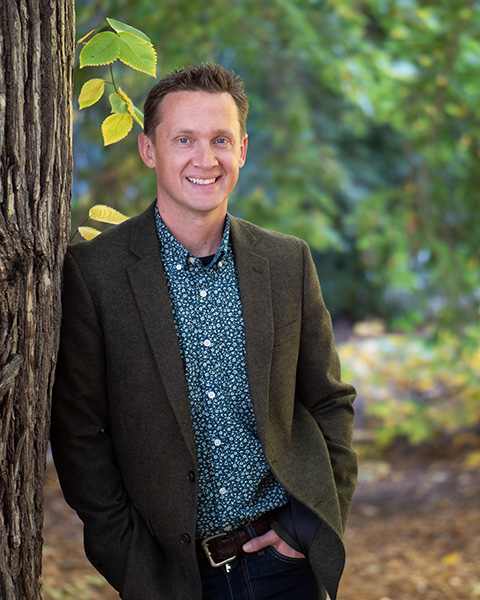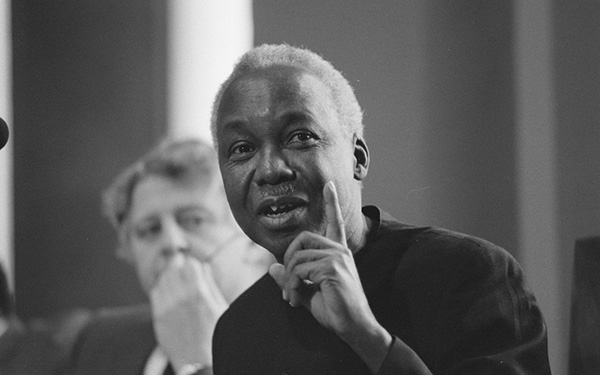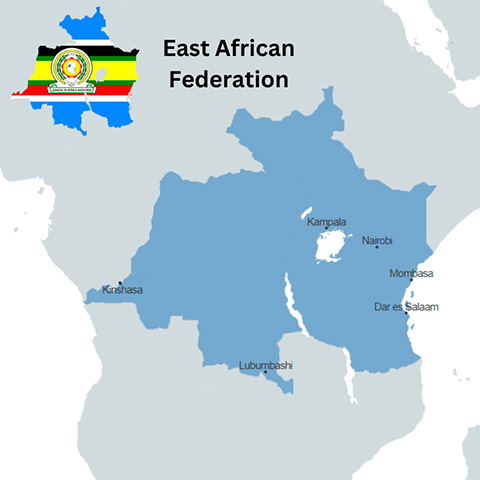From Denver to Dar es Salaam
Exploring African history with Ethan Sanders, Ph.D.
By Dave Francois

Ethan Sanders, Ph.D., an associate professor of History, Politics and Political Economy at Regis University, brings a unique lens to the study of African history. His journey from a Denver high school student with a “blank spot on [his] mental map” regarding Africa, to a scholar of East African politics and religion, has led him to uncover deeper insights about Pan-Africanism, its historical figures and the movement’s enduring legacy.
“I basically learned no African history growing up in Denver. It was the absence of that … it was kind of like the one sort of blank spot in my mental map of the world,” Sanders said. Despite being exposed to American and European history, Africa remained an enigma. This gap in his knowledge would eventually drive him to explore the continent’s complex historical landscape, particularly in East Africa.
When Sanders was an undergrad student at Baylor University, a world history survey sparked his interest in Africa after his class read V.S. Naipaul’s A Bend in the River, a 1979 novel that explores the tumultuous political and social upheaval of post-colonial Africa. However, it wasn’t until graduate school at the University of Cambridge that he truly dove into African history, specializing in East Africa and global intellectual history.
Sanders’ research focuses on Pan-Africanism, a political and cultural ideology advocating for the unity of Africans and people of African descent. He offers a distinctive approach by identifying two expressions of this ideology: “redemptive” and “practical” Pan-Africanism.
“I promote using the most simple and inclusive definition of Pan- Africanism and then discussing the many expressions of it.”
“Redemptive Pan-Africanism” is rooted in the religious and spiritual belief that African unity is divinely ordained — a perspective originating from 19th-century interpretations of biblical passages. By contrast, “practical Pan-Africanism” is more grounded in the socio-political realities of Africa, focusing on unity as a means for political representation and mutual support in areas such as food security and legal rights.
Sanders is also working on an intellectual and religious biography of Julius Nyerere, Tanzania’s first president and a key figure in African independence movements. His research delves into the ways Nyerere’s Catholic faith and academic training informed his policies — particularly ujamaa, the Swahili term for “familyhood,” which became central to African nationalist and socialist movements.

“[Nyerere is] the most important African that most Americans have never heard of,” Sanders said. But that hasn’t stopped him from sharing his ideas with a wider audience. In fact, Sanders was recently a keynote speaker at a symposium in Rome, where he discussed Nyerere’s lasting impact on African politics, ujamaa and even the thinking of modern Popes.
"There's really four strands of Nyerere's thought," Sanders notes, "the Western political canon, his Zanaki upbringing, Pan-African ideas and Catholic social teaching." Sanders has meticulously combed through Nyerere’s extensive writings and personal library, hoping to bring to light the influence of his faith on his vision for Tanzania and Africa as a whole. Sanders emphasizes the importance of African history in his teaching at Regis, hoping to broaden students’ perspectives and encourage them to engage with global challenges.
“One of the aims of history in the Jesuit tradition is to understand that the world is bigger than us — bigger than Denver, bigger than Colorado or the United States,” he said.
He wants his students to learn from Africa’s rich history and cultures and to see the interconnectedness of global issues. “Maybe, just maybe, they will devote their own life to solving these problems that have connections with Africa or … use those skills to approach whatever problem it is they face.”
Sanders’ work is a testament to the importance of filling in the blank spots of our own mental maps, reminding us that understanding Africa’s past is essential to understanding the world’s future.

East African Federation: A new global power in the making?
The proposed East African Federation, if realized, would unite eight nations — Kenya, Uganda, Tanzania, Rwanda, Burundi, South Sudan, Somalia and the Democratic Republic of Congo (DRC) — into what would become the third most populous country in the world, well behind India and China, but just ahead of the United States.
Regis professor Ethan Sanders, Ph.D., noted the idea of a united federation has been around for nearly 100 years, with pan-Africanist Julius Nyerere envisioning it as a way for East Africa to gain greater political and economic sovereignty. “The biggest theoretical issue,” Sanders explained, “is whether the people of East Africa will be willing to see themselves as Africans first, and Tanzanians, Kenyans, Ugandans, etc., second.”
Negotiating the ethnic, linguistic and religious diversity of the region will be a major challenge, as will stabilizing member states like Somalia and the DRC, which have faced decades of conflict. “Would greater East African unity be able to change all this?” Sanders wondered. “Time will tell.”

Article by Dave Francois
About the Author
Ethan Sanders
Contact this ExpertMore From This Issue
Share Your Thoughts
Email us or write in to the Regis University Magazine at 3333 Regis Blvd, L-27, Denver 80221
